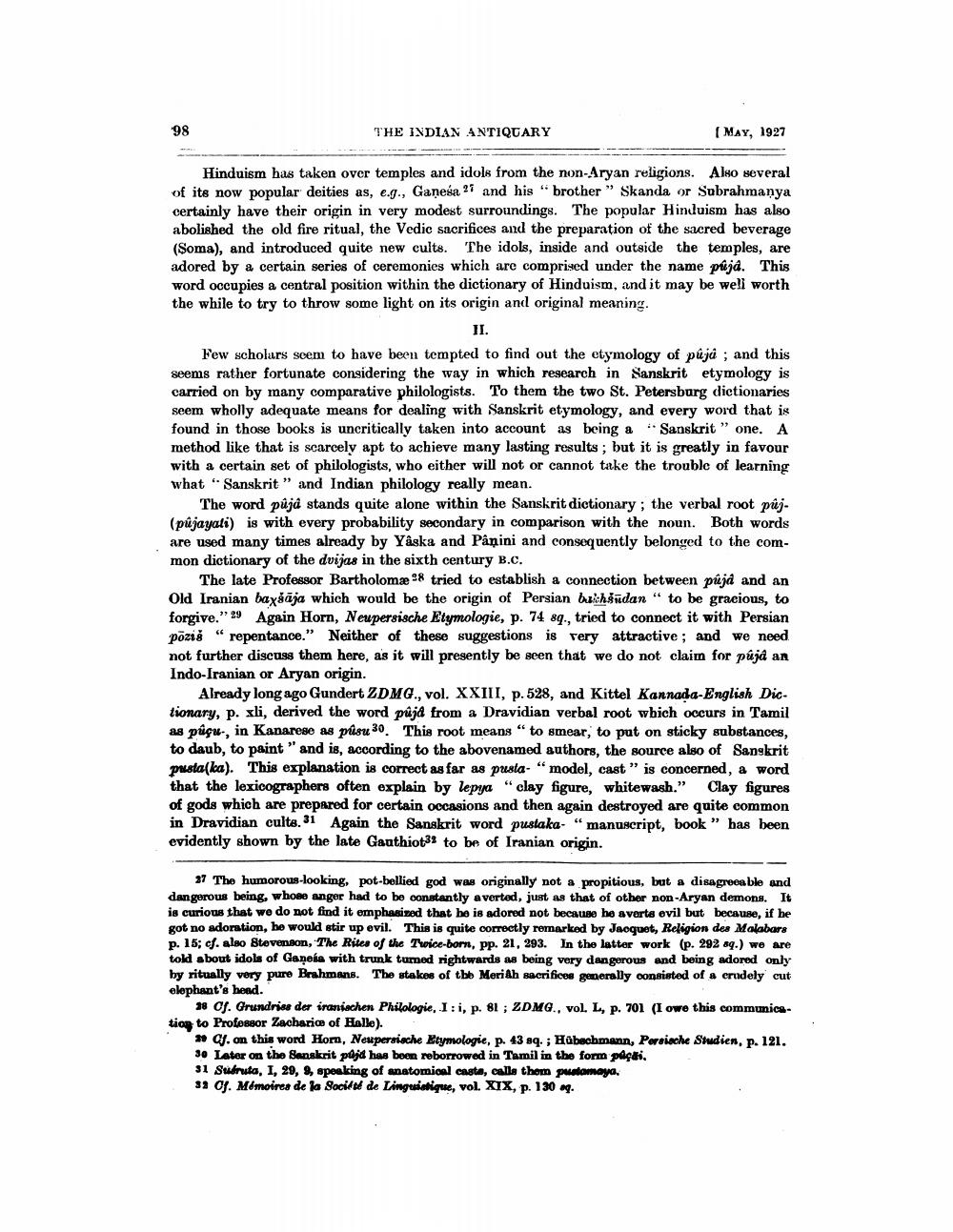________________
98
THE INDIAN ANTIQUARY
(MAY, 1927
Hinduism has taken over temples and idols from the non-Aryan religions. Also several of its now popular deities as, e.g., Ganesa ?i and his brother" Skanda or Subrahmanya certainly have their origin in very modest surroundings. The popular Hinduism has also abolished the old fire ritual, the Vedic sacrifices and the preparation of the sacred beverage (Soma), and introduced quite new cults. The idols, inside and outside the temples, are adored by a certain series of ceremonies which are comprised under the name puja. This word occupies a central position within the dictionary of Hinduism, and it may be well worth the while to try to throw some light on its origin and original meaning.
II.
Few scholars seem to have been tempted to find out the etymology of půjd ; and this seems rather fortunate considering the way in which research in Sanskrit etymology is carried on by many comparative philologists. To them the two St. Petersburg dictionaries seem wholly adequate means for dealing with Sanskrit etymology, and every word that is found in those books is uncritically taken into account as being a Sanskrit " one. A method like that is scarcely apt to achieve many lasting results; but it is greatly in favour with a certain set of philologists, who either will not or cannot take the trouble of learning what "Sanskrit " and Indian philology really mean.
The word půjå stands quite alone within the Sanskrit dictionary; the verbal root půj(pújayali) is with every probability secondary in comparison with the noun. Both words are used many times already by Yaska and Påņini and consequently belonged to the common dictionary of the dvijas in the sixth century B.C.
The late Professor Bartholomæ 8 tried to establish a connection between půjd and an Old Iranian baxsaja which would be the origin of Persian bathsudan “ to be gracious, to forgive." 29 Again Horn, Neupersische Etymologie, p. 74 89., tried to connect it with Persian poziš "repentance." Neither of these suggestions is very attractive; and we need not further discuss them here, as it will presently be seen that we do not claim for pújá an Indo-Iranian or Aryan origin.
Already long ago Gundert ZDMG., vol. XXIII, p. 528, and Kittel Kannada-English Dic. tionary, p. xli, derived the word půjd from a Dravidian verbal root which occurs in Tamil as púgu-, in Kanarese as pisu 30. This root means "to smear, to put on sticky substances, to daub, to paint "and is, according to the abovenamed authors, the source also of Sanskrit presta(ka). This explanation is correct as far as pusta- "model, cast" is concerned, a word that the lexicographers often explain by lepya "clay figure, whitewash.” Clay figures of gods which are prepared for certain occasions and then again destroyed are quite common in Dravidian cults. 31 Again the Sanskrit word pustaka- "manuscript, book” has been evidently shown by the late Gauthiot32 to be of Iranian origin.
37 The humorous-looking, pot-bellied god was originally not a propitious, but a disagreeable and dangerous being, whose anger had to be constantly averted, just as that of other non-Aryan demons. It is curious that we do not find it emphasized that he is adored not because he averts evil but because, if he got no adoration, he would stir up evil. This is quite correctly remarked by Jacquet, Religion des Malabars p. 15; cf. also Stevenson, The Rites of the Thoice-born, pp. 21, 293. In the latter work (p. 292 sq.) we are told about idols of Ganoia with trunk tumed rightwards as being very dangerous and being adored only by ritually very pure Brahmans. The stakes of tbb Meri Ah sacrificee gemerally consisted of a crudely cut elephant's head.
18 Cf. Grundriss der iranischen Philologie, 1:1, p. 81; ZDMG., vol. L, p. 701 (I owe this communicetion to Professor Zachariæ of Halle).
-> Cf. on this word Hom, Neupersiache Etymologie, p. 43 sq. ; Häbechmann, Persiache Studien, p. 121. 30 Later on the Sanskrit půjd has been reborrowed in Tamil in the form puçi 31 Sufruta, I, 20, , speaking of anatomical caste, calls thom putamaya, 33 of. Mémoires de la Société de Linguistique, vol. XIX, p. 130 n.




